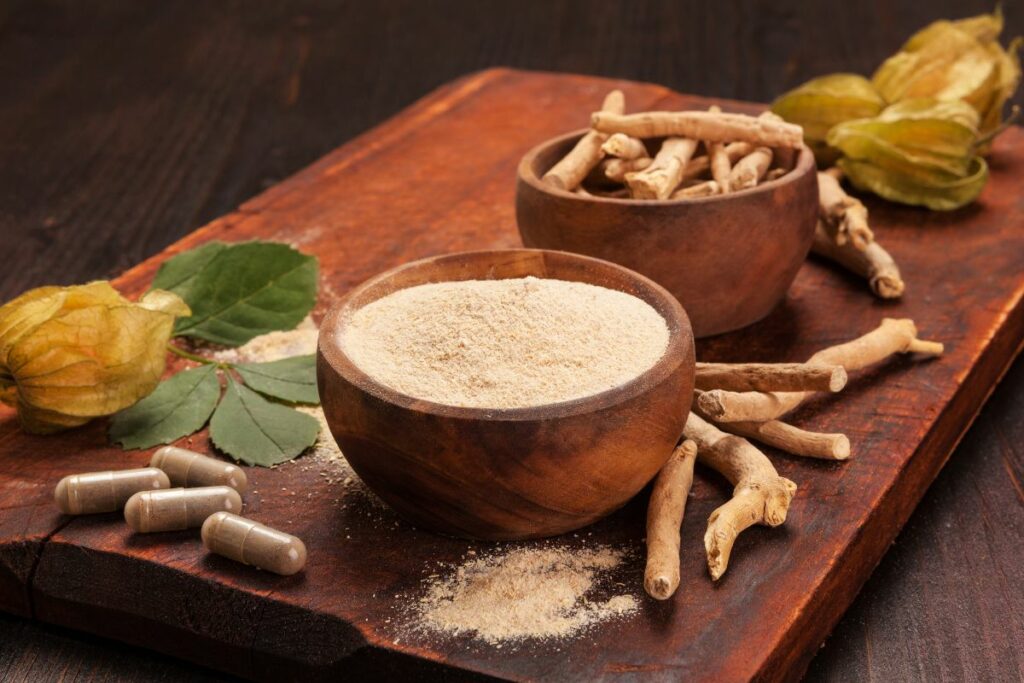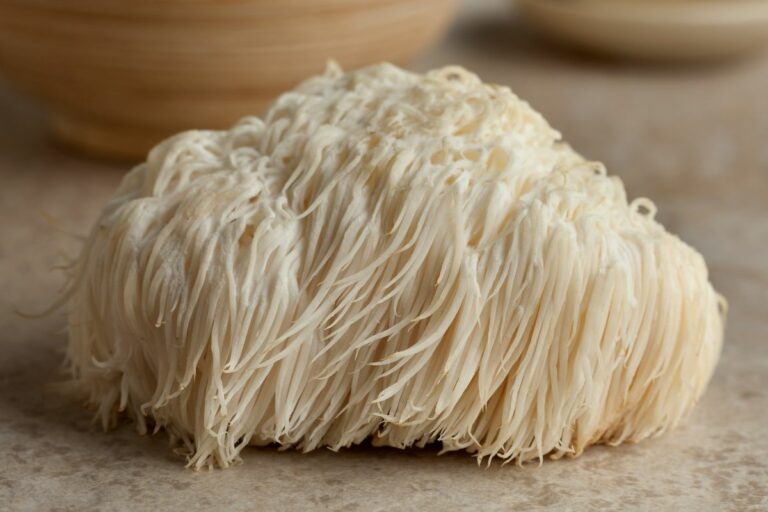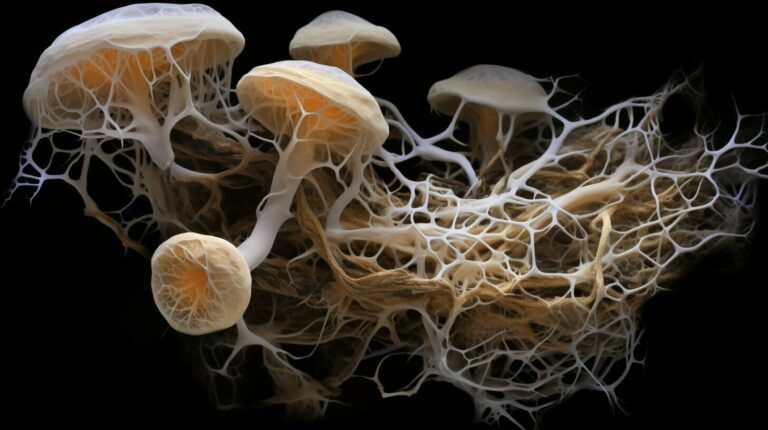Ashwagandha has been a popular herbal remedy in traditional medicine for centuries, particularly in Ayurveda, the traditional Indian system of medicine. Known for its adaptogenic properties, it has been used to help the body adapt to stress, improve energy levels, and support overall health. However, the question remains, is ashwagandha a mushroom?
The answer to this query is no, ashwagandha is not a mushroom. It is actually a small shrub with the botanical name Withania somnifera, which belongs to the Solanaceae (nightshade) family of plants. The root and berry extracts of this plant are what’s used in various supplements and herbal remedies, rather than being a mushroom or fungus.
While ashwagandha is not a mushroom itself, it is sometimes combined with other well-known medicinal mushrooms, such as maitake (Grifola frondosa), to enhance their health benefits. This combination provides a balanced mixture of adaptogenic properties and immune-supporting effects, maximizing their potential as a holistic health supplement.
Ashwagandha: An Overview
Table of Contents
Ashwagandha, scientifically known as Withania somnifera, is a popular herb commonly referred to as Indian ginseng or winter cherry. It has been extensively used in Ayurveda, the traditional Indian system of medicine, for centuries.
This powerful adaptogenic herb is native to India, North Africa, and the Middle East. It grows as a small, woody shrub with yellow flowers and red berries. Various parts of the plant, including its roots, leaves, and berries, are used to create herbal remedies and supplements.
| Attribute | Description |
|---|---|
| Botanical Name | Withania somnifera |
| Common Names | Ashwagandha, Indian ginseng, Winter cherry |
| Family | Solanaceae (nightshade family) |
| Plant Type | Herbaceous shrub |
| Origin | Native to India, parts of Asia, and Africa |
| Traditional Use | Used for centuries in Ayurvedic medicine as an adaptogen to combat stress and promote vitality |
| Parts Used | Root and leaves |
| Active Compounds | Withanolides (steroidal lactones), alkaloids, saponins, and others |
| Adaptogenic Properties | Helps the body adapt to stress and balance physiological functions |
| Health Benefits | – Stress reduction and anxiety management – Improved energy and vitality – Enhanced cognitive function – Immune system support – Potential anti-inflammatory and antioxidant effects |
| Preparation | Available as dried root powder, capsules, extracts, and tinctures |
| Dosage | Varies by form and individual needs, typically 300 to 600 mg of root extract per day |
| Safety | Generally considered safe when used as directed. Consult with a healthcare professional if pregnant, nursing, or taking medications. |
| Potential Side Effects | Rare, but can include upset stomach, diarrhea, or allergic reactions in sensitive individuals |
| Interactions | May interact with certain medications, including immunosuppressants and thyroid medications. Consult with a healthcare provider if taking medication. |
| Legal Status | Widely available as a dietary supplement and herbal remedy. |
| Research | Ongoing studies exploring its potential benefits for a range of health conditions. |
Ashwagandha has a wide range of potential health benefits. It is known for its ability to help reduce stress and anxiety by regulating cortisol levels. In addition, it may improve cognitive function, memory, and mental focus, making it a popular choice for those seeking to enhance brain health.
The herb has also been shown to support a healthy immune system by stimulating white blood cell production and decreasing inflammation in the body. Moreover, some studies suggest that ashwagandha may have potential in promoting fertility, as it has been observed to improve sperm quality and increase testosterone levels in men.
In Ayurvedic medicine, ashwagandha is considered a rasayana, which means it helps maintain youthfulness and promotes longevity. It is often combined with other herbs to address specific health concerns. For instance, ashwagandha is frequently paired with other adaptogenic herbs like Rhodiola and Chaga mushrooms to enhance their individual effects.
Overall, ashwagandha is a versatile herb with numerous potential benefits for the mind and body. Its adaptogenic properties have made it an essential component of traditional and modern herbal medicine. However, it is vital to consult a qualified healthcare professional before adding ashwagandha supplements to your regimen to ensure their safety and effectiveness for your specific needs.
Benefits of Ashwagandha

Ashwagandha, an ancient Ayurvedic herb, is known for its adaptogenic properties. As an adaptogen, it helps the body to manage and adapt to stress, promoting general well-being. The herb provides numerous benefits for various health concerns, including anxiety, stress, sleep, memory, arthritis, and aging.
- One key benefit of ashwagandha is its role in alleviating anxiety and stress. When consumed, it helps regulate cortisol levels, which are responsible for the body’s stress response. By managing cortisol levels, ashwagandha supports the body to cope with daily stressors, resulting in reduced anxiety and improved mood.
- Sleep and insomnia are other areas where ashwagandha has shown promising results. It works by promoting relaxation and regulating sleep patterns, helping those who struggle with sleep issues to achieve a more restful night’s sleep.
- In terms of cognitive function, ashwagandha has been found to enhance memory and concentration. Its neuroprotective properties safeguard the brain against age-related cognitive decline, supporting overall mental health.
- Ashwagandha also offers significant anti-inflammatory benefits, making it a viable option for individuals suffering from arthritis and joint pain. Its anti-inflammatory properties help reduce swelling and discomfort, providing relief to those with chronic pain.
- The herb is known to bolster the immune system, owing to its adaptogenic properties. By enhancing immune function, ashwagandha helps the body resist infections and illnesses. This immune-boosting quality makes it a valuable addition to one’s daily routine, especially during periods of increased stress or fatigue.
- Finally, ashwagandha has been linked to increased strength and muscle growth. It supports muscle strength by improving overall energy levels and promoting lean muscle mass, making it a popular choice among fitness enthusiasts.
In summary, ashwagandha provides an array of health benefits for various concerns, including anxiety, stress, sleep, memory, arthritis, aging, and overall immune function. As a versatile adaptogenic herb with a proven history of use, ashwagandha can be a valuable addition to one’s health regimen.
Side Effects of Ashwagandha
Ashwagandha, known scientifically as Withania somnifera, is a popular herb with various health benefits. However, it is important to be aware of its potential side effects. It is worth noting that Ashwagandha is not a mushroom, but instead, it belongs to the nightshade family of plants.
Some of the commonly reported side effects of Ashwagandha are:
- Diarrhea: This symptom may arise in some individuals upon the initial consumption of Ashwagandha. It usually subsides as the body adjusts to the herb.
- Vomiting and nausea: These symptoms have been occasionally reported, particularly when Ashwagandha is taken in high doses.
- Headache: A mild headache may be experienced by some individuals, especially during the first few days of taking Ashwagandha supplements.
- Drowsiness: Since the herb is known for its stress-reducing and calming properties, mild drowsiness may occur in some users.
- Gastrointestinal upset: In rare cases, Ashwagandha may cause gastrointestinal discomfort, including gas, bloating, and stomach cramps. It is advised to consume the herb with food to minimize these effects.
It should be emphasized that the side effects mentioned above are generally mild and rare, as Ashwagandha is considered safe for most individuals when taken in the recommended dosages. It is crucial to consult a healthcare professional before incorporating Ashwagandha into your daily routine, especially if taking prescription medications, as herb-drug interactions could occur in some cases.
Pregnant and breastfeeding women should avoid using Ashwagandha, as there is not enough information on its safety for this demographic. Additionally, individuals with autoimmune diseases, such as lupus, rheumatoid arthritis, or multiple sclerosis, should use caution when considering the use of Ashwagandha, as it may potentially interfere with their immune system and medications.
Ashwagandha and Chronic Conditions
Ashwagandha, scientifically known as Withania somnifera, is a powerful adaptogenic herb that has been known for its numerous medicinal uses. Although not a mushroom, it has been associated with numerous health benefits that may prove beneficial in managing various chronic conditions.
- For people with diabetes, ashwagandha may aid in regulating blood sugar levels by enhancing the secretion of insulin and improving insulin sensitivity in muscle cells. This, in turn, could help in controlling the consequences of high blood pressure or hypertension, which is a common comorbidity of diabetes.
- Rheumatoid arthritis, an autoimmune disease affecting the joints, may benefit from the herb’s anti-inflammatory properties. Ashwagandha has been found to suppress the activation of immune cells responsible for inflammation, potentially reducing pain, swelling, and other symptoms associated with arthritis.
- Heart disease is often linked to factors such as obesity, high cholesterol, and hypertension. Ashwagandha is believed to possess cardioprotective qualities, which may decrease the risk of heart-related issues. It has been suggested that it can aid in weight management, reduce inflammation, and lower lipid levels in the bloodstream, thus playing a role in preventing heart disease.
- Lupus, another autoimmune disorder, has also seen potential benefits from ashwagandha supplementation. The herb’s immunomodulatory effects could help balance the immune system’s activity and reduce the severity of lupus symptoms.
- Thyroid function plays a crucial role in maintaining the body’s overall metabolism and energy levels. Ashwagandha is known to stimulate thyroid function; it can be used as a supportive measure for those with hypothyroidism or low thyroid hormone production.
- Epilepsy, a central nervous system condition characterized by seizures, might find relief through ashwagandha’s potential anticonvulsant and neuroprotective effects. While further research is required, early studies show promise in the herb’s ability to reduce seizure frequency in some cases.
In conclusion, ashwagandha is a versatile herb that holds potential for managing various chronic conditions such as diabetes, rheumatoid arthritis, heart disease, high blood pressure, lupus, and epilepsy. As always, it is crucial to consult with a healthcare professional before incorporating ashwagandha or any other supplement into your daily regimen, particularly when managing chronic conditions.
Dosage and Administration

Ashwagandha, also known as Withania somnifera, is a popular herbal supplement, and it is not a mushroom. It belongs to the Solanaceae family of plants and has been used in traditional medicine for centuries. The following dosage and administration guidelines can help ensure safe and effective use of ashwagandha.
The recommended daily dosage of ashwagandha varies depending on the form of the supplement being taken. For capsules, it is generally advised to take 1 to 6 grams of dry root per day according to Cleveland Clinic. If using a tincture, the dosage may differ, so it is important to follow the instructions provided on the product label.
When first starting to take ashwagandha, it is recommended to begin with a lower dose and gradually increase it over time to assess individual tolerance levels. This approach can help minimize potential side effects and allow the body to adapt to the supplement.
It is crucial to consider any potential contraindications before using ashwagandha. Pregnant women should avoid this herb, as higher doses can induce abortion as mentioned by the National Institutes of Health. Additionally, patients on anticonvulsants, barbiturates, and benzodiazepines should also avoid taking ashwagandha due to potential drug interactions.
To ensure the best results, it is essential to choose a high-quality ashwagandha supplement from a reputable manufacturer. Look for products that have undergone third-party testing for purity and potency, and avoid products with unnecessary fillers and additives.
In conclusion, ashwagandha can be a beneficial supplement for various health issues when used correctly. By following the proper dosage and administration guidelines and paying attention to potential contraindications, individuals can make the most of its therapeutic potential.
Interactions with Medications
Ashwagandha, a popular herb known for its adaptogenic properties, is not a mushroom but a small shrub belonging to the Solanaceae family. Despite its various health benefits, it’s essential to be aware of potential interactions it may have with certain medications. This section focuses on the possible interactions between ashwagandha and medications, mainly immunosuppressants and diabetes medications.
Immunosuppressants are medications used to suppress the immune system, usually prescribed to patients undergoing organ transplant or those suffering from autoimmune disorders. Ashwagandha, on the other hand, is known for its immune-boosting properties. Thus, taking ashwagandha along with immunosuppressants may lead to reduced effectiveness of the latter. If you are on immunosuppressive therapy, it is crucial to consult your healthcare provider before using ashwagandha.
Diabetes medications aim to control blood sugar levels, and ashwagandha has been found to have positive effects on lowering blood glucose levels. Consequently, taking ashwagandha in combination with diabetes medications, like insulin or oral hypoglycemic agents, may result in excessively low blood sugar levels (hypoglycemia). This can cause symptoms such as dizziness, sweating, and rapid heartbeat. It is advisable to monitor your blood sugar levels regularly if you are using ashwagandha along with diabetes medications.
It’s important to note that ashwagandha may also interact with other medications, including sedatives, antivirals, and blood thinners. Although these interactions might not always be harmful, it’s wise to exercise caution and discuss your herbal supplement use with your healthcare practitioner.
In summary, ashwagandha, while offering numerous health benefits, may interact negatively with some medications, particularly immunosuppressants and diabetes medications. Always seek professional advice before incorporating ashwagandha into your daily routine, especially if you are currently taking prescribed medications.
Ashwagandha and Reproductive Health

Ashwagandha, scientifically known as Withania somnifera, is a popular herb in traditional medicine that has been used for centuries to improve reproductive health. It is not a mushroom, but rather a small shrub native to India, the Middle East, and parts of Africa^[1^].
Ashwagandha has been known to have a positive impact on fertility and reproductive health in both men and women. In men, this herb is believed to enhance sperm count and sperm motility, reducing cases of infertility. Studies have shown that regular consumption of Ashwagandha may result in a significant increase in testosterone levels, sperm count, and sperm quality^[2^]. This makes it an attractive option for men dealing with infertility or sexual dysfunction.
In women, Ashwagandha has been associated with improving hormonal balance, supporting menstrual health, and reducing the symptoms of polycystic ovary syndrome (PCOS)^[3^]. The herb is also suggested to combat stress-related infertility by regulating stress hormones and lowering cortisol levels. Reduced stress levels may help in enhancing overall reproductive health.
However, it is important to note that Ashwagandha should be used with caution during pregnancy and breastfeeding. While some studies indicate potential benefits like reducing stress during pregnancy, others suggest possible risks, including premature birth and low birth weight^[4^]. It is crucial to consult with a healthcare professional before taking Ashwagandha, especially for pregnant or breastfeeding women.
Overall, Ashwagandha shows promising results in improving fertility and reproductive health in both men and women. Its ability to regulate stress levels and balance hormones may have significant implications for those dealing with infertility or sexual dysfunction. Nonetheless, it is essential that individuals considering the use of Ashwagandha for reproductive health consult with a healthcare professional before beginning supplementation.
Ashwagandha in Comparison
Ashwagandha, also known as Withania somnifera, is a popular herb in Ayurvedic medicine. It is a small, woody shrub native to India, North Africa, and the Middle East. Despite its popularity, it is important to note that ashwagandha is not a mushroom. It belongs to the Solanaceae family, which includes plants like tomatoes and potatoes.
Comparing ashwagandha to other adaptogenic herbs can provide a better understanding of its properties and benefits.
- Panax ginseng, commonly known as Asian ginseng, is a famous adaptogen that has been used in traditional Chinese medicine for thousands of years. It is known to boost energy levels, support the immune system, and improve cognitive function. However, Panax ginseng is not related to ashwagandha as it is a root from the Araliaceae family.
- American ginseng (Panax quinquefolius), another adaptogenic herb, is native to North America and shares similarities with Panax ginseng in terms of its benefits. Like ashwagandha and Panax ginseng, American ginseng is known to stimulate the immune system, reduce stress, and enhance mental function. However, it is also a root that belongs to the Araliaceae family, making it different from ashwagandha in its botanical classification.
- Eleuthero (Eleutherococcus senticosus), also known as Siberian ginseng, is yet another adaptogenic herb that has been traditionally used in China and Russia. This herb is known to help the body adapt to stress, increase energy levels, and support the immune system. Eleuthero, unlike ashwagandha, is part of the Acanthopanax genus in the Araliaceae family, making it a distant cousin to the true ginseng plants.
In conclusion, ashwagandha is a unique plant in the world of adaptogenic herbs due to its distinct botanical classification. While it shares some similar benefits with other adaptogens like Panax ginseng, American ginseng, and eleuthero, it stands apart as it is not a mushroom, nor is it a root from the same family as ginseng. This sets ashwagandha apart in its properties and applications for overall health and well-being.
Frequently Asked Questions
Is Ashwagandha related to Cordyceps?
Ashwagandha (Withania somnifera) and Cordyceps are both classified as adaptogens, which are plants and mushrooms that help the body respond to stress, anxiety, and fatigue. However, Ashwagandha is a plant, whereas Cordyceps is a type of fungus. They are not directly related but share similar benefits in supporting overall wellbeing by helping the body adapt to various stressors.
What are the benefits of Mushroom Adaptogens?
Mushroom adaptogens offer a range of potential health benefits. Some common benefits include supporting immune function, promoting cognitive health, reducing stress and anxiety, and boosting energy levels. The specific effects vary depending on the type of adaptogenic mushroom, such as Reishi, Cordyceps, or Lion’s Mane.
Can Ashwagandha be combined with other adaptogenic mushrooms?
Yes, Ashwagandha can be combined with other adaptogenic mushrooms like Reishi, Cordyceps, or Lion’s Mane to create synergistic effects in promoting overall health and stress resilience. However, it is essential to consult with a healthcare practitioner before starting any new supplement regimen or combining multiple adaptogens, especially if you have a pre-existing medical condition or are taking medications.
What are the differences between Ashwagandha and Lion’s Mane?
Ashwagandha and Lion’s Mane are both adaptogens, but they have different properties and potential benefits. Ashwagandha is a plant known for its stress-relieving and immune-modulating properties, while Lion’s Mane is a mushroom that is recognized for its cognitive and neurological health benefits. Ashwagandha helps to calm the stress response and support hormonal balance, whereas Lion’s Mane aids in improving mental clarity, focus, and memory.
Is there a special Ashwagandha-infused coffee?
Yes, there are specialty coffees available that contain Ashwagandha as one of the ingredients. These products combine the stimulating effects of coffee with the stress-relieving properties of Ashwagandha, providing a balanced source of energy and mental focus without causing excessive agitation or jitters typically associated with caffeinated beverages.
Can Ashwagandha be consumed as a tea?
Ashwagandha can be consumed as a tea by steeping its powdered root or dried leaves in hot water. The mild, earthy flavor of Ashwagandha tea can be enjoyed alone, or sweeteners and other herbs can be added to tailor the taste to your preference. Ashwagandha tea is a convenient and relaxing way to enjoy the benefits of this adaptogenic herb, particularly for those who want to unwind and alleviate stress before bedtime.







